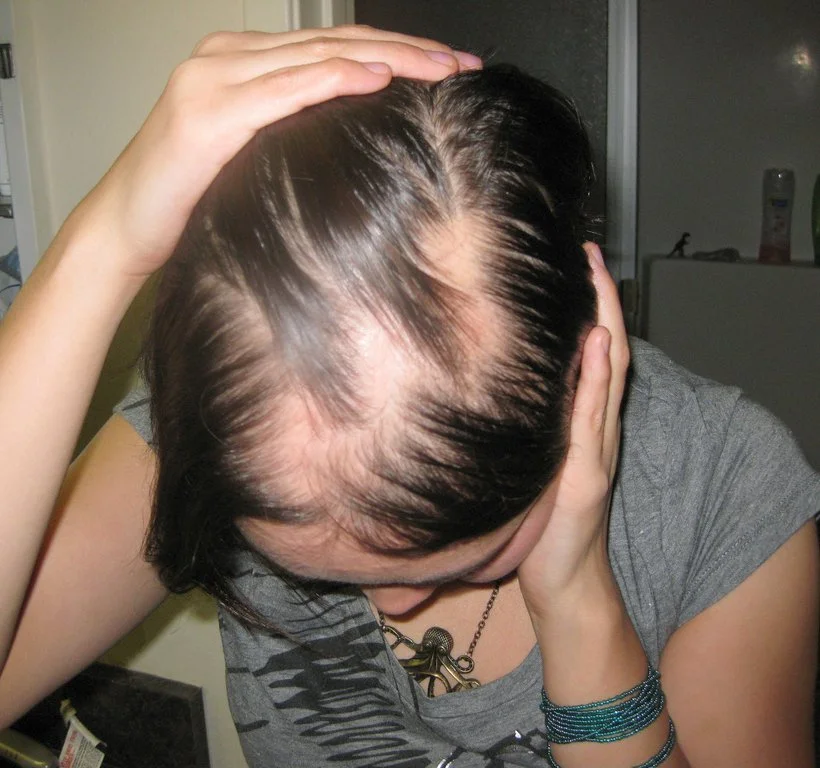Thyroid and Hair Loss
Alopecia or loss of hair is a common thyroid disorder related symptom that affects both men and women. Hair loss is caused by many types of thyroid disorders, including hyperthyroidism and hypothyroidism. Initially, a thyroid disease can cause dry hair that slowly presents with thinning and coarseness. American Association of Clinical Endocrinologists has reported that thyroid disease affects more than eight out of ten female patients and results in significant hair loss.In general, the thyroid gland ceases to function normally as in case of thyroid conditions; hence, results in a plethora of side effects in the system, and hair loss constitutes one of its symptoms. The hair follicles either cease to perform normal function or slow down the growth of new hair as the body fails to metabolize food into energy. Hair thinning of diffuse nature is the first symptom of a thyroid disorder and it later gradually progresses across the whole scalp. Hair fallout can occur rarely in few cases presenting with a thyroid hormone imbalance.
Mechanism of thyroid related hair loss
Normally, the thyroid gland function is to release triiodothyronine (T3) and thyroxine (T4) hormones into the bloodstream to regulate wide range of body functions, including the regulation of central nervous system and metabolism. An overactive thyroid gland apparently stimulates the production of excess of hormones, which tend to boost the metabolic rate by assisting the system to drive energy into the cells. An over-functioning thyroid gland increases the heart rate, nervousness, perspiration, including hair loss. Moreover, the hormonal imbalance ceases the growth of hair from the hair follicles. Hence prescription thyroid hormones should be taken daily to correct the problem as the hair regrowth occurs when the body produces appropriate hormones to promote hair formation.
Hair growth normally includes three phases, the catagen phase,anagen phase, and dormant phase. The general hair growth mechanism ceases due to lack of hormonal balance as in case of hypothyroidism or hyperthyroidism. Thyroid malfunctions can trigger the hair follicles to be in a dormant phase for a long term than usual. This results in the stalling of hair growth and eventual hair loss.Hair loss is significantly influenced by various hormonal dysfunctions within the system. Dihydrotestosterone (DHT) causes shrinkage of the hair follicles, causing hair loss and ultimately results in disappearance. The hair loss rapidly progresses in both men and women by the influence of both hypothyroidism and hyperthyroidism as these conditions trigger the conversion mechanism of testosterone to DHT in the system.
Hair related signs in thyroid disorders
Some of the commonly experienced hair related signs during thyroid disorders are as follows:
Initially, the hair presents with easy breakage and tangling
Hair presents with an altered texture, fine thinning with evident roughness or coarseness
Hair tends to become brittle and straw like.
Altered hair quality and the hair can’t retain a curl or perm.
Amount of hair loss is specific to each affected patient
Hair fallout isn’t limited to only scalp, but also becomes evident in arms, underarms and legs
Hair becomes dry and presents with poor general condition.
Sparse eyebrows and loss of body hair
Excessive hair shedding is more common in hypothyroidism.
Types of thyroid disorders associated with hair loss
Hair loss can be caused by various thyroid conditions which are as follows:
Hypothyroidism
An under active thyroid gland in hypothyroidism produces insufficient amount of thyroid hormones that doesn’t meet the body needs. Hence, one of the significant signs of hypothyroidism is hair thinning of the eyebrows and hair loss on the scalp.
Hyperthyroidism
An overactive thyroid gland in hyperthyroidism produces excess of thyroid hormones than it should. As a result, the skin presents with fragility and thinning; including rapid hair loss.
Thyroiditis
Thyroiditis is an inflammation of the thyroid gland triggered by a bacterial or viral infection.
The thyroid gland inflammation can apparently impair the thyroid gland function and causes various symptoms, including hair loss.
Post-partum Thyroiditis
Grossly about one out of ten women tend to develop post-partum thyroiditis soon after delivering a baby.
The condition is triggered by significant changes in metabolism as females tend to undergo during pregnancy and post-delivery.
Myxedema
Myxedema is a serious manifestation of both Hyperthyroidism and Hypothyroidism. The common signs associated with this condition includes hair loss and balding in addition to potentially harmful complications like renal failure.
Graves’ disease
Graves’ disease is commonly inherited by women. The disease, which can be triggered by severe emotional stress, is not fatal but does cause hair loss.
It is an autoimmune disorder that can be triggered by emotional distress and can cause significant hair loss.
The condition is a result of impaired immune function that stimulates the thyroid gland to secrete excess of hormones.
Filed Under: Thyroid and Hair Loss


